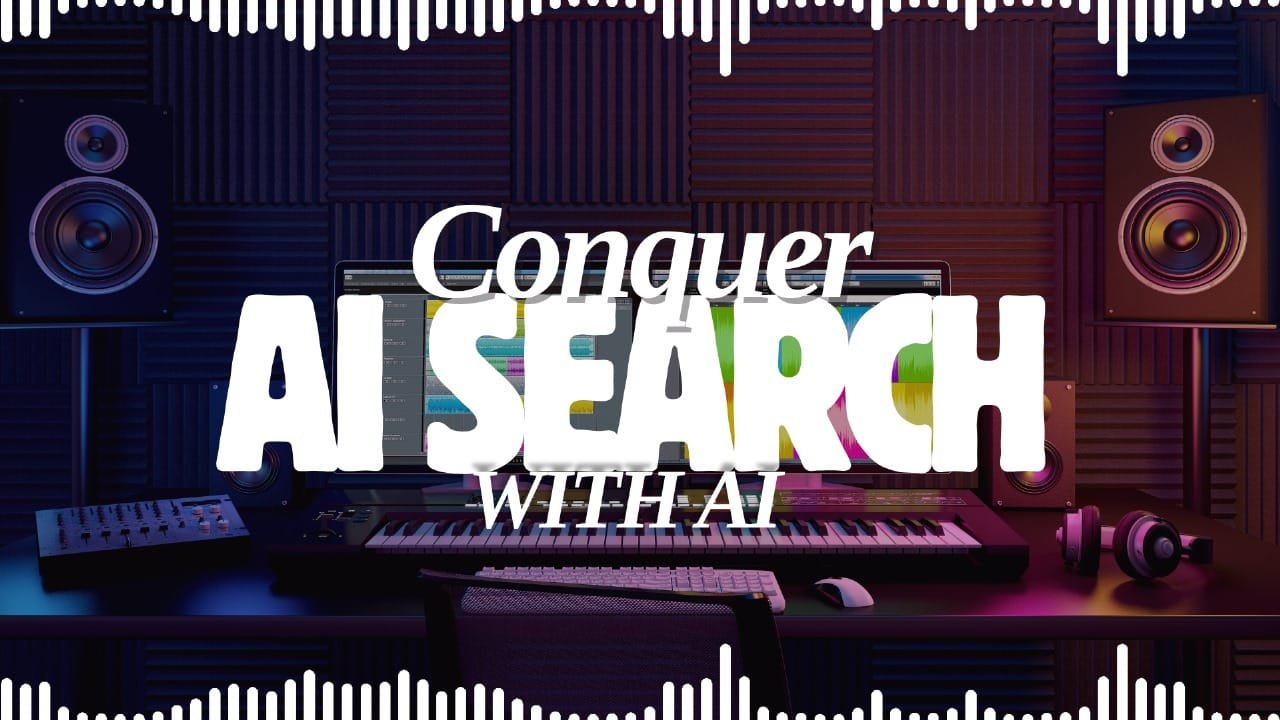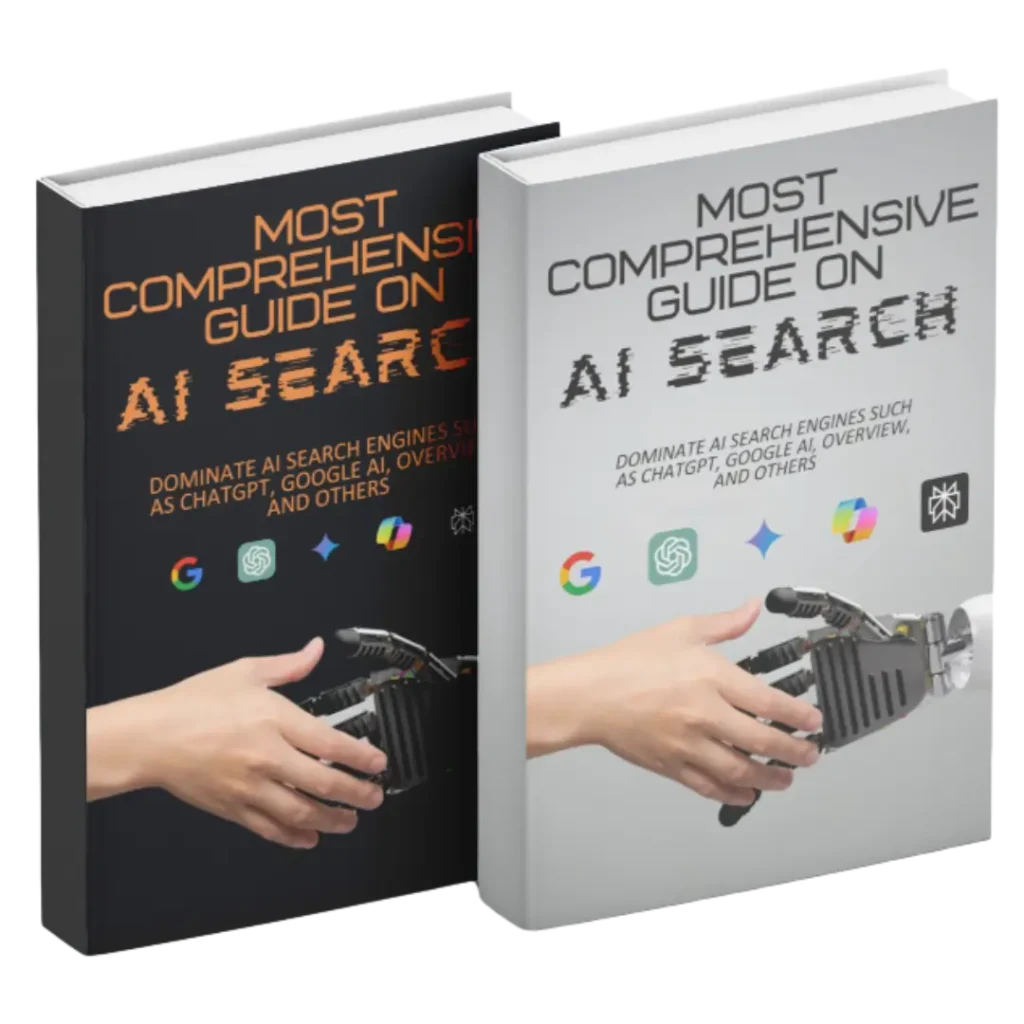Why 90M Americans Might Laugh at Your SEO by 2027


Ep #4: Google Breakup: Marketing Implications | Conquer AI Search With AI
Conquer AI Search With AI
Also available on:
The days of typing queries into Google and scrolling through pages of blue links are numbered. If you don’t believe me, let me paint a picture for you: you’re planning to run a marathon next month and want to buy a good pair of shoes for it. However, you remember that last year you were diagnosed with plantar fasciitis. Consider the scenario where you ask a person, “What are the best running shoes for marathon runners with plantar fasciitis?” Instead of digging through endless lists of results and ads, you receive an answer in response to your inquiry. All that is required is no clicks, no distractions—just what is needed immediately. Sounds like a consumer’s dream coming true, right? But for marketers, it’s nothing short of a disaster!
Welcome to the AI Search Era (a.k.a. “Wait, where did my web traffic go?”)
By 2027, over 90 million Americans are predicted to ditch traditional search engines for AI-powered tools like ChatGPT, Claude, and Gemini to find answers, products, and services. If your marketing strategy still revolves around outdated SEO tactics, you’re not just behind the curve—you’re risking irrelevance.
In our latest Conquer AI Search podcast episode, we unpack why the seismic shift to AI search is collapsing traditional SEO—and what marketers, content creators, and businesses must do to survive. Here’s a glimpse of what’s at stake.
The Numbers Don’t Lie (Even If They Sound Wild)
Let us go back to the year 2023, when approximately 13 million U.S. adults already relied on generative AI for web searches. Now, let us fast-forward to 2027. That number might reach 90 million. This is equivalent to the entire population of Germany from Googling to asking ChatGPT if their leftovers are still edible.
To sum up everything: this is not an anomaly. It is a permanent phenomenon. If you’re a marketer, an SEO content specialist, or a marketer, this is not just a shift, it’s a cataclysmic event. And you’re left with one of two options: riding on it or getting drenched.
Why This Shift Matters: A Big Change in How We Search
Let’s look at some numbers: in 2023, around 13 million adults in America considered using generative AI as their primary method for accessing information on the internet. This figure is projected to surge to 90 million by 2027.
This sort of change is not something that happens infinitely. Almost two-thirds of adults— or 68%— of the US population is expected to depend on AI tools for basic information in 2027. That is a pretty big deal.
If you’re in any part of the digital marketing world, from SEO to content strategy, this is a signal that things are changing, and fast. But what does this change really mean for businesses and marketers? Let’s explore the reasons behind this shift and what it will mean moving forward.
What’s Fueling the Shift? Let’s Break It Down
1. We’re Tired. So Tired.
Let’s consider the reality: conventional search methods are quite tiring. When browsing the internet, everything needs to be taken care of quickly and in a straightforward manner. Users no longer wish to deal with endless clicking, pop up advertisements, and reading irrelevant SEO-optimized content that offers no value.
If you’re in the middle of an argument with a friend about whether penguins have knees (spoiler: they do, weirdly), you probably don’t want to get lost scrolling through a bunch of blue links, ads, and random blog stuff. You just want a straight answer, not a bunch of choices.
AI gets that. Ask it something, and it doesn’t make you work for it. It serves up a tight, clean, no-fluff answer like your smart friend who never brags about reading the manual. That’s the new gold standard.
What this means for you:
If your content does not have instantly applicable and easily understandable answers, you may risk getting lost in this new era of AI. We live in the age where people are searching for solutions to their problems instantly and AI is proficient in providing those.
2. The Ad Game is Changing — Fast
One of the biggest implications of AI-driven search is how it affects the traditional ad model. Right now, businesses rely on ads to drive traffic. But if AI gives users answers directly, they won’t need to click through to your website — and that means less ad revenue.
Imagine you’re looking for running shoes. Instead of seeing a list of sponsored ads for Nike, Adidas, or New Balance, an AI might just suggest the best shoe based on your needs, and the brands don’t even get a chance to showcase their ads.
👉 Translation for brands: You need to start thinking beyond the banner. Storytelling, product relevance, and building real awareness matter more now than ever. You can’t just pay to play — you’ve got to earn attention.

Are You Monitoring Your Brand Online?
Try Our FREE Brand Visibility Grader!
🟧 Instantly audit your brand’s online presence & sentiment.
🟧 See how visible you are compared to your competitors.
🟧 Discover where you’re winning — and where you’re not.
3. Google’s Got Bigger Problems Than Your Bounce Rate
While AI search is gaining momentum, Google is facing major antitrust lawsuits over its dominance in search and ad tech. We’re talking: splitting off Chrome, breaking exclusive deals, and making room for new search players.
Interestingly, OpenAI, the people who made ChatGPT, are thinking about buying Wild, right?
👉 Takeaway: If you’ve been relying on Google traffic like it’s an IV drip, it’s time to diversify. Think AI search, multi-platform, multi-format, and (deep breath) maybe even TikTok.
4. SEO is Dead (At Least, the SEO You Know)
For decades, marketers obsessed over keywords, backlinks, and meta tags. But AI doesn’t care about your cleverly placed H1 tags. Generative AI scans content for value, not just keywords. If your blog posts are stuffed with empty phrases designed to game algorithms, AI tools—and the users relying on them—will ignore you. The result? Traffic plummets, and your “optimized” content becomes digital wallpaper.
5. The Rise of Generative Engine Optimization (GEO)
Say it with me: Generative Engine Optimization.
It’s not about stuffing keywords into headers anymore. It’s about structuring your content in a way that’s readable and “bot-friendly.” And not just any bots — smart bots that can summarize, synthesize, and choose what content to quote.
What you can do:
- Focus on quality: Content that’s deep, authoritative, and helpful is more likely to be picked up by AI engines.
- Prioritize transparency: AI needs to know exactly how your content is structured, so be clear and organized.
Technical excellence: Your website should be fast, reliable, and easy for AI bots to crawl.
6. Relationships > Cookies (Yes, Even the Double-Chocolate Kind)
In an era where data privacy is a big concern and cookies are on their way out, building strong relationships with clients and users is more important than ever. First-party and zero-party data (data that users willingly provide, like preferences or survey responses) will be your best assets moving forward.
Because here’s the thing: trust is the new currency. If someone feels seen, heard, and valued, they’ll share their preferences — no shady tracking required.
👉 TL;DR: Relationships are back in fashion. Authenticity wins. Brands that treat people like people (not just data points) will thrive.
So... Now What?
The rise of AI search isn’t something that’s coming — it’s already here, and it’s only going to grow. And while the tools are changing, the heart of great marketing isn’t. It’s still about understanding people. Being helpful. Showing up when it matters.
Now, it’s all about discovering how to engage with AI-powered search engines, ensuring your content is viewed and connects with people and AI bots alike.
So, the primary concern is: what will you do to adapt to the new era of search engines? Would you passively observe the changes, or would you make the necessary adjustments and take charge in this new world?
The power rests in your hands. Let’s welcome what’s next together!
Are you ready to optimize for AI-driven search? Let us know how you’re planning to adapt in the comments!


 Overcast
Overcast
 Castro
Castro




